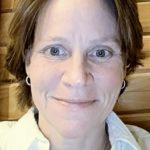These Extraordinary Days
 In the introduction to their book The Future We Choose: Surviving the Climate Crisis, the authors wrote, “The world is on fire, from the Amazon to California, from Australia to the Siberian Arctic. The hour is late, and the moment of consequence, so long delayed, is now upon us. Do we watch the world burn, or do we choose to do what is necessary to achieve a different future? Who we understand ourselves to be determines the choice we will make. That choice determines what will become of us. The choice is both simple and complex, but above all it is urgent.”
In the introduction to their book The Future We Choose: Surviving the Climate Crisis, the authors wrote, “The world is on fire, from the Amazon to California, from Australia to the Siberian Arctic. The hour is late, and the moment of consequence, so long delayed, is now upon us. Do we watch the world burn, or do we choose to do what is necessary to achieve a different future? Who we understand ourselves to be determines the choice we will make. That choice determines what will become of us. The choice is both simple and complex, but above all it is urgent.”
Christiana Figueres and Tom Rivett-Carnac talk about the various climate events that have contributed to a more fragile planet over the past fifty years. The populations of mammals, fish, reptiles and birds have declined by 60%. Half of the world’s coral reefs have disappeared. Also, the Arctic summer sea ice is rapidly shrinking.
Over the past several months, we’ve been reading about the extensive wildfires in California and Canada as well as the ever rising temperatures in Phoenix and other parts of the Southwest. And now, we’re watching wildfires in Oklahoma, historic heat records in the central region of the United States, new hottest night records in Indonesia and Thailand, and a year’s worth of rain fell in 8 hours in Valencia, Spain.
And even here in Duluth — which many people still proclaim as a climate haven — we are facing a number of climate impacts, including a warming Lake Superior with growing pockets of microplastics and algae blooms, increased number of air quality alerts from Canadian wildfires, and severe droughts in various sections of northeastern Minnesota.
So much has happened since the Duluth City Council passed the climate emergency resolution in April 2021. Globally, the CO2 atmospheric levels continue to rise, and we’re seeing new high temperatures during the daytime and nighttime hours. Also, we keep hearing about the decline or disappearance of different species around the planet.
In her essay “Difficult is Not the Same as Impossible,” from the book Not Too Late: Changing the Climate Story from Despair to Possibility, Rebecca Solnit writes, “We are deep in an emergency. But it is not too late, because the emergency is not over. The outcome is not decided. We are deciding it now.”
Solnit proposes that despair is an emotion but not an analysis. She reminds us that what we think and feel is inevitable is not always what happens in our lives. Therefore, we need to remember that the future is the result of what we do in the present moment.
Also, in another essay within the same book entitled “What to Do When the World is Ending,” Yotam Maron writes about what we all need to do when we feel like the world is ending and there is a deep feeling of despair. Maron argues that despair is not about reality but is really about our own personal sadness and fear.
“Despair is a self-fulfilling prophecy; it blocks us from taking agency, which makes it all the more likely that our worst fears will come to pass,” stated Marom.
Here in Duluth, we can no longer be in denial and, just as importantly, we must not become overwhelmed with despair. Yes, these are very challenging days in this new and ever changing climate-change world, but they could also be extraordinary days for our city and everyone who calls Duluth their home. Extraordinary in the sense that we are presented with a very unique opportunity to redefine our lives and lead more resilient and meaningful lives. We can reconnect with nature, lead healthier lives, and become a more hospitable city to our vulnerable populations.
You could go for a walk instead of jumping in the car, build a pollinator garden in your front yard instead of keeping a manicured lawn, recycle instead of throwing everything in the garbage can, grow vegetables in a community garden instead of going to the grocery store, and support or join a climate or environmental organization instead of sitting at home in front of the television.
With all the difficult and devastating news that we’re reading about this climate emergency, we can still decide how we want to respond. In this “moment of consequence,” we can choose a brighter future for ourselves and our grandchildren.
As a holocaust survivor and author of Embracing Hope, Viktor Frankl writes, “I must be open. I must keep my eyes open. I must have broad horizons in order to notice what’s going on, to notice when and where life might offer me a hidden possibility for finding meaning.”
There are so many opportunities in Duluth for all of us to face climate change with open eyes and an open mind. The possibilities for a more resilient, sustainable and environmentally just city are unlimited.
Make yourself a promise to find and embrace every moment to become a climate citizen in our city. Speak to your elected officials. Join the Citizens Climate Lobby, Sierra Club or other local groups. Teach classes on climate education. Provide support groups for young people experiencing climate anxiety.
Today could be an extraordinary day for our city. It’s simply up to each of us to remember that our futures will be determined by the choices and decisions we make right now. So, let us choose to move forward with a greater sense of compassion, creativity and courage in this new climate reality.
In the prologue to his book Dangerous Years: Climate Change, the Long Emergency, and the Way Forward, David W. Orr writes, “There is a great deal that we do not know, but we do know that the centuries ahead will demand the most extraordinary things of us.” Orr proposes that all of us must sacrifice and be committed to being “good citizens and better neighbors” as we explore and embrace empowering visions for our city’s future.
Hopefully, in this climate emergency, we can heed Orr’s call for Duluth.
Recommended Links:
Leave a Comment
Only registered members can post a comment , Login / Register Here














No Comments